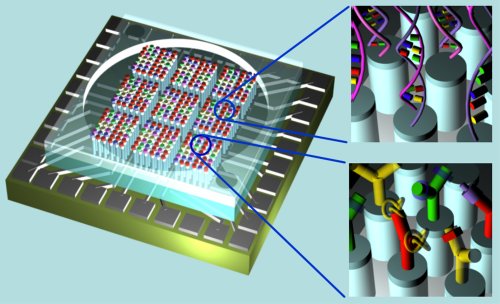
Ethical Considerations
Biosensors are detecting devices that rely on the specificity of cells and molecules to identify and measure substances at extremely low concentrations. Biosensors have not developed yet into a widely known technological innovation thus creating many ethical and legal issues surrounding their use. For instance an issue that arises is whether rich countries should have the privilege to continue living longer while poor countries will keep dying younger. However, imagine telling someone who is dying of say, cancer, that they cannot use the technology available. Some issues include whether rich countries should have the privilege to continue to live longer while poor countries will keep dying younger. Most who agree with expanding the technology will agree that we should be able to live longer by incorporating mechanical parts not just organic parts. Another issue is in terms of environmental applications; How should biosensors be applied to nature at large and could the magnetic field produced by the electrical parts perhaps effect certain species of animals? Also what kind of security should be obtained to protect people with implants from hackers? In order for the biosensor to be effective it must communicate to an external source, likely through wireless signals and likely at substantial distances to provide optimal medical coverage for the patient. Wireless communication is more risky than land based lines because the signal can become intercepted. It seems that only people only with money or governments with money will be able to use this advancement in the technological field of biosensors. Also another possible issue is since government healthcare has passed, will government healthcare cover biosensor implants as they may help people know when to see the doctor and thus prices will go up for visits and insurance, and is so will older or younger individuals get more monitoring than others? This can cause a lot of problems because then discrimination will occur amongst patients.
Legal Issues
Biosensors are something that as of now people can not obtain easily. They can help in numerous ways and especially help people with health problems but this can also inflate the number of people going for visits to doctors. Currently, there are no set regulations or policies that specifically apply to the field of biosensors. This is due to the fact that biosensors are still in so called prototype phase, meaning that only a small quantity of biosensors have been created, mainly for testing purposes. Since sensors that can monitor biological systems have just come into study within the past ten to twenty years, policies do not vary from country to country, as no countries have actually made any sort of regulations. In terms of hypothesized legal issues, an interesting issue is will every country agree to allow broadcasting of biosensor signals or will some not support these signals, because if a country does not support these signals on their public radio spectrum, then the sensor will not work for that individual while they are in the area. This can cause a lot of problems and fighting between sovereign bodies and could possibly be a part of the fuel to start a war. The legal issue that thus presents itself is should new agencies be established to research new ways of encrypting data so that people do not become vulnerable to weak spots which hackers can then manipulate, and if so, should so much trust be placed in security personnel who have total control over the fate of the patient. Another legal issue that may emerge is will different prices be placed on different levels of monitoring and checking the sensors? If so, this can lead to a whole different finical crisis to support biosensors. What types of regulations will have to be placed on the manufacturers of biosensors as to maintain quality control so that patients do not get some sort of poisoning or protect patients from faulty code that may cause the biosensor to act spastically and may hurt the person instead of help them. New forms of insurance will have to be created to protect hospitals and doctors from harm that may occur because of biosensors, and this is yet another legal issue. Even though they may be proven in tests and labs, biosensors can still have faulty parts. Doctors and researchers still do not know whether they are safe or have health effects when applied to humans and careful study of interactions between biosensors and the systems of the body will have to be regulated in order for biosensors to integrate into society in the future.